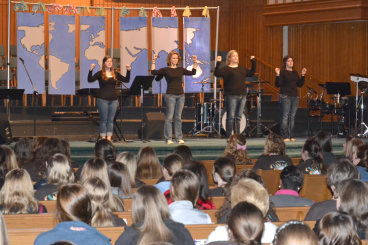As the muddy floodwaters of Suriname’s Tapanahoni River recede, thousands of Aukan villagers who live along the river are welcoming a flood of a another kind: help, and lots of it.
Rice, anti-malaria drugs, gasoline and hundreds of thousands of dollars in relief funds are pouring into the country’s waterlogged interior, and the International Mission Board (IMB) is playing a critical role in addressing what the Surinamese government calls an “unprecedented” crisis.
Days of torrential rains swamped Suriname’s remote rainforest for a week beginning May 1, forcing an estimated 22,000 people from their homes and severely affecting another 15,000, according to a United Nations disaster assessment and coordination team. At their height, floodwaters inundated more than 10,000 to 15,500 square miles as rivers rose to levels not seen in recent memory.
Some 60 percent of the population along the Tapanahoni River alone was displaced by the flooding, including Aukaners evacuated from four island villages near the home of IMB missionaries Charles and Brittany Shirey. The Shireys run a radio ministry to share the gospel with the Aukaners. The program is called “Radio Paakati — 88.3 FM.” Since the flood, however, the station has been pulling double duty, broadcasting both Bible stories and news about the disaster.
Charles Shirey said the station is acting as a key communications hub during the crisis due to the extreme isolation of the Aukan people. More than 100 miles from the nearest road, their villages are accessible only by air or by boat. They live so deep in the jungle that no television, cell phones or any other means of electronic communication can reach them — except Radio Paakati.
Besides rallying prayer, the station’s biggest boon has been its ability to coordinate logistics, letting villagers know when and from where help is coming. Shirey said Radio Paakati is airing reports about locations for food distribution, tips for combating flood-spawned illnesses such as malaria and diarrhea and even live interviews with aid organizations and government officials working to get more help to people in the interior.
Though most villages have no electricity, Aukaners are able to listen to the station with battery-powered radios.
Paakati normally broadcasts every night from 5 to 11, but the flooding has created the need for two hours of programming in the morning and afternoon. Shirey said the station has remained on the air since the flooding began, thanks to a gas generator, 15-foot stilts as the studio’s foundation and a backup plan: a disc jockey and emergency studio on top of the mountain where the radio station’s transmitter stands. Most important of all, Shirey said, the Bible stories and Christian music the station plays have not stopped either.
Shirey said it is crucial for the station to continue broadcasting, especially during a crisis. He said after three years of operation, Aukaners have come to depend on Radio Paakati.
Though its gospel message has recently met resistance from a few Aukan leaders, the station’s service during the flood has only strengthened its standing in the community.
However, broadcasting news bulletins and Bible stories has not been the IMB’s only response to the disaster. The Southern Baptist missions entity also has released an initial $22,000 for relief work. IMB strategy coordinator Tim McClard said the money primarily is being used to airlift thousands of food packets and other aid material from Suriname’s capital, Paramaribo, to dozens of small airstrips scattered throughout the interior. Such charter flights aren’t cheap, and McClard said the cost was preventing aid groups from getting enough supplies into the hands of the people who needed them. So far, the IMB has sponsored more than 20 flights. Returning planes are loaded with evacuees fleeing to Paramaribo.
A portion of the relief money also has been used to buy drums of gasoline. Aukaners and other groups living in Suriname’s interior use the country’s rivers like roads — dugout canoes with outboard motors are their “cars.” But fuel is very expensive outside the city, and there is little extra to go around in a crisis. Shirey said the gas powers boats delivering food packets from the airstrips to outlying villages. He has helped hand out more than 600 food packets in his area alone.
Short-term humanitarian needs aside, Shirey hopes the biggest impact from the IMB’s relief work in Suriname will be eternal. He said God is using the flood to soften hearts to the gospel, and he already has witnessed God at work.
“It has given us huge credibility steps with men,” Shirey said. “When I showed up with the food, they just kept saying, ‘Charles, we really thank you for this, this is a big thing — you came out here when we needed help, and you’re still here now.’” (BP)





Share with others: